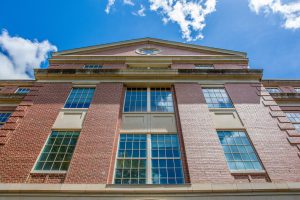A new online master’s degree program in clinical laboratory science designed for working professionals—the first of its kind our state—will prepare its graduates for service through education, research, and clinical laboratory administration. The program, housed in the Department of Allied Health Sciences’ Division of Clinical Laboratory Science, will contribute to innovative solutions for better delivery of health care and address the statewide shortage of clinical laboratory professionals.

UNC-Chapel Hill alumni who work in this field see great needs in the workforce. Susan Lanning-Taylor ’85 works in laboratory science and understands the interplay between the laboratory and the future of health care.
“Laboratories are in a transformative stage,” Lanning-Taylor said. “Laboratory managers have the opportunity to develop new strategies for managing patient populations, to change sick care into health care, and to drive improved outcomes. This new degree program is key as educators and industry experts are at the forefront to shape the future of laboratory services.”
According to the U.S. Bureau of Labor Statistics, employment of laboratory professionals will increase by 13 percent by 2020; undergraduate and graduate-level programs are only able to fill one-third of that workforce demand. Graduates of the master’s program will be an integral part of shaping the future of the laboratory profession and health care systems. Today’s clinical leaders are tasked with closing gaps in health care in order to achieve better health outcomes for patients.
Susan Beck, the division’s director, said laboratory scientists deliver critical data to health care teams and often work behind the scenes to drive diagnostic decisions in areas such as microbiology, hematology, clinical chemistry, and transfusion medicine.
“The graduates of our bachelor’s degree program can pursue roles as generalists or choose to specialize in an area,” Beck said. “This master’s program builds off of these skills to provide leadership skills needed in today’s clinical laboratory.”
Division faculty, whose expertise ranges from interprofessional education to establishing laboratory standards, and diagnostic methods, have devised the curriculum, which culminates in a capstone project.
Stephen R. Hooper, associate dean and chair of the Department of Allied Health Sciences, said the program embodies the department’s commitment as a state leader in building the health professions infrastructure in the state of North Carolina.
“This new training program will go a long way to addressing one of the state’s critical needs,” Hooper said. “I am proud of this new program and look forward to its positive impact across the state of North Carolina and the surrounding region.”
The master’s program alumni will be prepared to serve as leaders in the laboratory profession through advanced coursework in molecular diagnostics, research design, laboratory administration, and educational methods. This will allow them to make contributions both to the profession and to institutions for which they work. Applications became available in August 2019.
The UNC School of Medicine Department of Allied Health Sciences houses seven divisions and multiple graduate and undergraduate programs within health science fields.
Susan Beck, PhD, MLS(ASCP)CM, is a professor within the division. Stephen R. Hooper, PhD, has served as DAHS associate dean and chair since 2013.